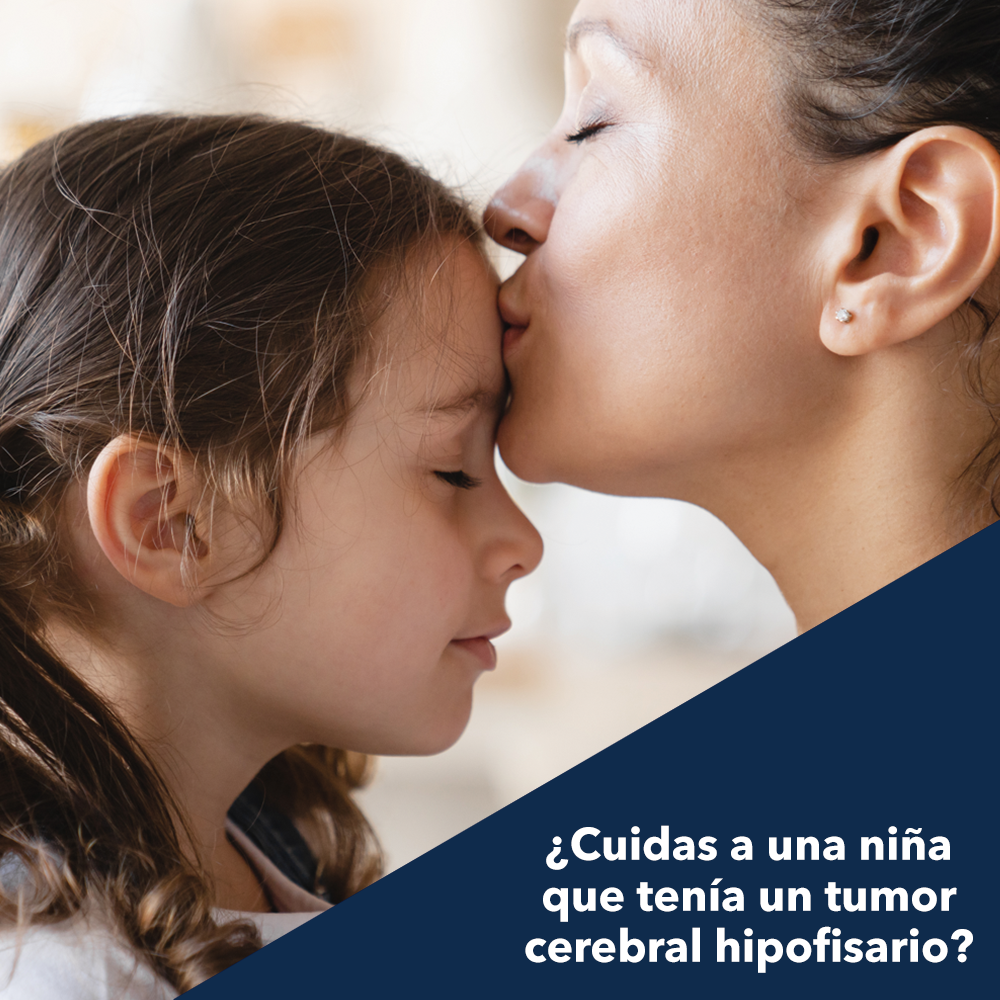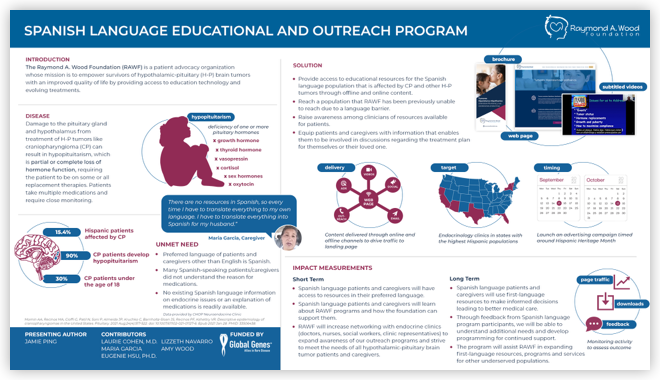In 2022, the Raymond A. Wood Foundation (RAWF) was named a grantee of the Global Genes Health Equity in RARE Impact grant to fund a project titled “Spanish Language Outreach and Education Program,” which was aimed to reach Spanish speakers affected by hypothalamic-pituitary brain tumors and provide easy-to-understand resources in Spanish.
The idea for the project came about when RAWF was attending the Pediatric Endocrine Society’s (PES) annual conference in 2022. When speaking with endocrinologists, they inquired if RAWF had resources available in Spanish to better explain the endocrine issues that affect their patients. These were resources we did not currently have available but wanted to prioritize in the coming years as highlighted in our recently completed 3-year strategic plan.
When RAWF learned about the Global Genes grant, we reached out to one of our scientific advisory board members, Dr. Shana McCormack, to see if she had any data on language preference at Children’s Hospital of Philadelphia. The available data confirmed that of the patients they currently treat, there were three additional languages preferences other than English. Spanish was selected most frequently by patients/families; followed by Arabic, and lastly Mandarin. While this was a limited sample, it was corroborated by doctors we spoke with at the PES conference.
According to the Pediatric Brain Tumor Foundation’s report of Childhood and Adolescent Brain Tumor Facts 2014 – 2018 which was based on data from the Central Brain Tumor Registry of the United States (CBTRUS), the incidence rates of tumors of the pituitary are the highest among the Hispanic population. Additionally, we know that through research done in 2021 entitled, “Descriptive epidemiology of craniopharyngiomas in the United States,” (Kshettry VR, et al) that 15.4% of craniopharyngioma patients were Hispanic. Through additional research we know that 90% of craniopharyngioma patients develop hypopituitarism.
>
“There are no resources in Spanish, so every time I have to translate everything to my own language. I have to translate everything into Spanish for my husband.”
What is the Rare Health Equity Grant?
The Global Genes Health Equity in RARE Impact Grant provides an opportunity for patient advocacy leaders to improve outreach strategies and address challenges that affect underserved and underrepresented patient communities. It gives foundation leaders and patient advocates the ability to stand up data collection tools, resources, and processes to better engage or understand the needs of their underserved communities, ultimately leading to more robust data sets for their rare disease, established standards of diagnosis and care, and a more comprehensive understanding of their disease and patient journey. Projects may address health inequities including but not limited to race, ethnicity, age, gender identity, religion, socioeconomic status (income, level of education, and occupation), geographic location and/or linguistic barriers.
Why was the Health Equity in Rare grant important for RAWF?
The Raymond A. Wood Foundation Board of Directors developed the 2022-2025 Fiscal Year Strategic Plan with a set of goals the organization aims to achieve over the next three years. An area of priority for RAWF was expanding outreach to populations within the community of hypothalamic-pituitary brain tumor survivors and caregivers by providing resources and education. The foundation saw an opportunity through the Global Genes grant to create Spanish resources to assist our patient population and their caregivers and pilot a program that could be leveraged for other patient communities. The project was led by RAWF’s outreach coordinator, Jamie Ping.
Unmet Need
Through the data we were able to collect, we learned that other than English, most patients preferred Spanish to be used when relaying medical information. Additionally through interviews with endocrinologists, we learned that:
-
Patients were sometimes put on medications not understanding why, or what the medications were for and, in some cases, maybe should not have been prescribed.
-
There was extremely limited medical information for hypothalamic-pituitary brain tumor patients and caregivers in Spanish and the information that was available was not easily accessible.
Solution
RAWF’s solution to this issue was a multi-pronged approach:
-
Create educational resources in Spanish that patients could easily access online (website, transcribed videos, social media campaign) and through printed resources pamphlets.
-
Reach Spanish speaking patients/caregivers that we had previously been unable to successfully reach by creating a social media campaign that spanned Hispanic Heritage Month, September 15-October 15, 2022. The social media campaign released a series of videos with caregiver Maria in both Spanish and English and posts in Spanish sharing resources and inspiration.
-
Raise awareness among clinicians about the resources (pamphlets/website/videos) that we created and provide them directly to providers in states with the highest Hispanic populations: California, Texas, Arizona, Florida, and New York. The program would allow us to directly reach five clinics per state for a total of thirty.
RAWF presented a poster on the project at the Global Genes Rare Patient Advocacy Summit in November 2022.
“This project was a learning experience for us to see how it would be received and if we would be able to reach patients that would most benefit,” said Amy Wood, executive director of RAWF. “After some trial and error, we learned that the best way to provide these resources was through Facebook advertising and a direct link to the brochure download which got a tremendous response.”
Acknowledgements
We recognize that this project could not have been possible without the support of so many in our community. This grant would not have been possible without the support of Global Genes through the Rare in Health Equity grant. Their generosity and continued support through the project allowed the grant project to be successful. Additionally, Dr. Shana McCormack provided important data to help validate the need for the project. Also, we owe sincere appreciation to Dr. Laurie Cohen, the Chief of the Division of Pediatric Endocrinology & Diabetes at the Children’s Hospital of Montefiore and Professor of Pediatrics at Albert Einstein College of Medicine. Lastly, we greatly appreciate the help of caregiver Maria Garcia for sharing her story with us.



